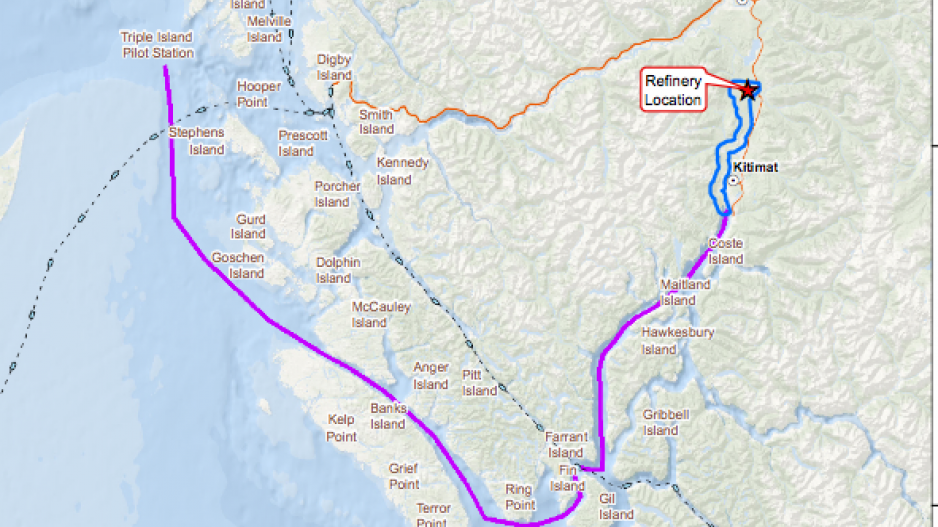Pacific Future Energy plans to bring bitumen from Alberta not by pipeline, but by rail, where it would be refined into gasoline, diesel and jet fuel.
It is one of two refineries that have been proposed for the area. The other, Kitimat Clean, is headed by B.C. newspaper owner David Black. That project has yet to file a project description with the BC EAO or CEAA.
The refinery would process 210,000 barrels per day of refined fuel products, which would require three to four trains each day, carrying a total of 360 to 480 rail cars.
Unlike the diluted bitumen that the Northern Gateway and Trans Mountain pipelines would move, the Pacific Future Energy project would bring in the bitumen in a dense, semi-solid state called neatbit.
The project would employ 3,500 people at peak during construction and 1,000 permanent employees. The refinery would be built on provincial Crown land at an industrial site called Dubose Flats.
The project is primarily within the territories of the Haisla and Kitselas First Nations. One of the company’s senior advisers is former Assembly of First Nations chief Shawn Atleo.
Samer Salameh, a Mexican businessman and former CEO of Mexican telecomm Azteca, who now lives in Vancouver, co-founded the company.
Salameh said the environmental review process is expected to take two years. If the project were to be approved and financed, it would be the first refinery to be built in North America in more than 30 years.
Salameh said he’s not concerned about an oil price crash, since refineries make money no matter where oil prices go.
“The stars of the oil industry today are refineries,” he said.
The project is being characterized as a low-carbon refinery, since it would use carbon capture, with the captured CO2 likely being sold to the Alberta oil sector for enhanced oil recovery.
It would also use lower carbon energy approaches to refining: natural gas, biomass and hydro power. The project would require 250 megawatts of power (about one quarter of the generating capacity of Site C.)
A typical refinery in the U.S., using Canadian crude, emits about 14 million tonnes of year of CO2, Salameh said.
“We would be issuing less than half a million tonnes a year,” Salameh said.
Salameh said the company has submitted the proposal to the Haisla and Kitselas but would not comment on whether the project has either nation’s support.
Should the project go forward, it would generate a significant amount of new infrastructure construction, including a new 40-kilometre road, a new railway terminal and railway connection to tie into an existing CN Rail line.
It would also need a water treatment plant. Most of the treated water would be recycled, but some would be released into Douglas Channel.
Refined fuel would move by tanker – two per week – on a route that avoids some of the more environmentally sensitive areas of Douglas Channel.
“We don’t believe that going up the Douglas Channel (and) the Hecate Strait makes any sense for a tanker,” Salameh said. “We don’t want to come anywhere close to Haida Gwaii. We’re going much further north, taking a much longer route to avoid the Skeena River, avoid Haida Gwaii, all that.”
A moratorium on oil tankers that the federal Liberal government plans to implement would not affect the project, as the tankers would be moving refined fuel products, not bitumen, which poses less of an environmental risk in the event of an oil spill.




